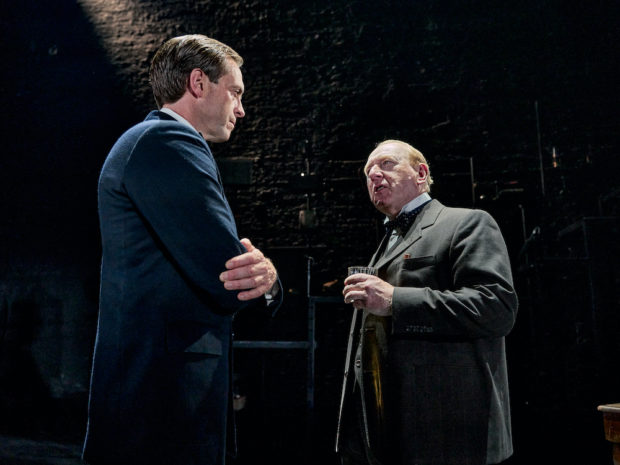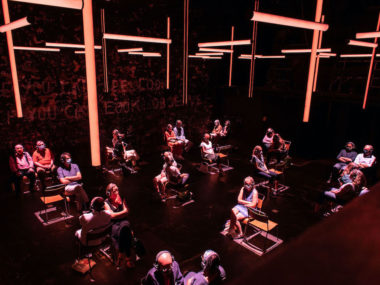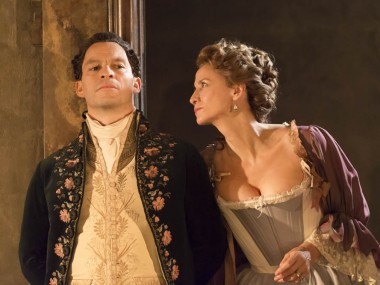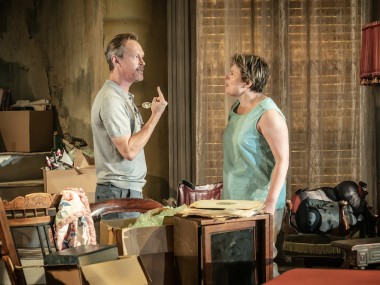When Winston Went to War with the Wireless, Donmar Warehouse
Monday 3rd July 2023

Can things change, or must they always stay the same? The latest history play by Jack Thorne, a man of the moment whose Harry Potter and the Cursed Child is still in the West End and whose National Theatre hit The Motive and the Cue will transfer in December, revisits the early history of the BBC to show how current tensions between public service impartiality and political expediency have a long backstory. With a title that evokes the past, When Winston Went to War with the Wireless is a lively play of ideas that sits comfortably in the Donmar Warehouse’s intimate surroundings. But is this enough?
Set during the 1926 General Strike, when the BBC was still the British Broadcasting Company (incorporated in the following year), the play tells the story of the clash between its founding father, the Presbyterian-minded autocrat John Reith, and the Conservative government of Stanley Baldwin, whose view of the media is summed up by his later adage about newspapers which goes: “What the proprietorship of these papers is aiming at is power, and power without responsibility — the prerogative of the harlot throughout the ages.” Ouch. But he was right — media is the fourth estate, and that has power. The question was, and still is, how does the media use that power?
In May 1926, with fierce class conflict on the streets as toffs try to break the unions and workers try to back the striking miners, Reith comes under pressure from Winston Churchill, Baldwin’s ambitious chancellor of the exchequer, who wants to turn the freshly set up BBC into a state broadcaster which obeys government orders. Reith, however, has a vision of an impartial news source which can be trusted by everyone because it speaks the truth by airing two sides of every question. He does not want to be the government’s propaganda mouthpiece.
For the newborn BBC, the General Strike was a godsend. Until then, newspaper owners had prevented it from broadcasting the news before 7pm because this free public service would undermine their sales. But when the print workers were on strike, newspaper production was curtailed and the BBC found a new role as a news broadcaster. But whose point of view would take precedence on these bulletins? One issue especially symbolises the debate: will Reith be allowed to broadcast a conciliatory speech by the archbishop of Canterbury — against Tory demands to shut him up?
Inspired by the audiobook of Andrew Marr’s A History of Modern Britain, Thorne fell in love with his subject and has researched not only the politics of the BBC news, but also gives a charming flavour of its early broadcast content: women’s hour and children’s hour, classical music and jazz, talks and debates. Today this is more twee than nostalgic, and Thorne struggles to free his drama from his research. The play is simply stuffed with detail, and much of this is problematic: he introduces a character called Isabel as a useful narrator, and then drops her; he has too much clumsy exposition and too many awkward domestic dialogues. The result is often messy, repetitive and unfocused.
Unsurprisingly, the central message is about the importance of truth in the media. Thorne’s way of complicating a difficult subject is not only to show the clash between political propaganda, enforced by Churchill’s bullying, and the strikers’ points of view, but also to paint Reith as a hypocrite: while he advocates for truth in broadcasting, shown in discussions with his more streetwise engineer Peter Eckersley, his love life is compromised. Although he is married to Muriel, his heart has been captured by young Charlie Bowser. He is living a lie.
The strength of the play, and perhaps its most depressing side, is that it shows how some things never change in this country. Especially resonant and relevant is its portrait of populist politicians who use comedy to mask their lust for power, plus subversive Russians, striking workers who are abused and libeled by the media (in this case denounced as Communists) and a media split between tabloid endorsements of the government and a desire to be fair and critical (the early BBC). If the play shows how the BBC caved in half the time in its early days and by compromise survived, today it seems to cave in every time. Like his subject, Thorne tries hard to be impartial, which I think makes his characters all a bit nicer than they were in reality.
The little gems of research — stuff about radio waves, and the quality of pitch needed to broadcast in radio’s infancy, along with insights into Reith’s boast that the medium was democratic because both rich and poor get the same service — are interesting, but they tend to muddy the storytelling. It’s lovely to hear novelty songs from the 1920s, about a piddling country dog called Pete for example, but these moments don’t really add anything to the main themes of the play, which are centred around the creation of this British arm’s length institution and the establishment of impartiality in all broadcasting (in contrast to a very partisan press — exemplified by Churchill’s editorship of the anti-strike Daily-Mail-style rag The British Gazette).
Directed with vim and vigour by Katy Rudd, the stage is often full of rushing prop tables and snapshots of workers and snatches of broadcasters, while a back wall of spirited Foley sound effects is used to convey the auditory flavour of early radio. Designer Laura Hopkins is greatly helped by Ben and Max Ringham’s sound effects, but our attention is mainly on the large and excellent cast. Stephen Campbell Moore’s Reith battles bravely and sincerely with both Adrian Scarborough’s aggressive Churchill and with the sun-soaked memory of Luke Newberry’s Charlie, while Shubham Saraf’s Eckersley, Hadyn Gwynne’s Baldwin and Mariam Haque’s Muriel give good support. But however charming and relevant, the feeling remains that the storytelling and the politics could have been so much sharper.
This review first appeared on The Arts Desk




